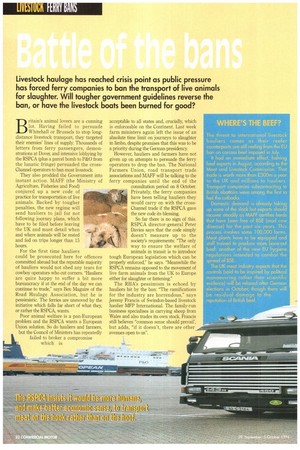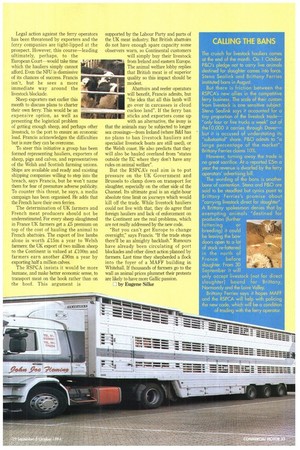Livestock haulage has reached crisis point as public pressure has
Page 34

Page 35

If you've noticed an error in this article please click here to report it so we can fix it.
forced ferry companies to ban the transport of live animals for slaughter. Will tougher government guidelines reverse the ban, or have the livestock boats been burned for good?
Britain's animal lovers are a cunning lot. Having failed to persuade Whitehall or Brussels to stop longdistance livestock transport, they targeted their enemies' lines of supply. Thousands of letters from ferry passengers, demonstrations at Dover, and intensive lobbying by the RSPCA (plus a parcel bomb to P&O from the lunatic fringe) persuaded the crossChannel operators to ban most livestock.
They also prodded the Government into instant action. MAFF (the Ministry of Agriculture, Fisheries and Food) conjured up a new code of practice for transportation of live animals. Backed by tougher penalties, the new regime will send hauliers to jail for not following journey plans, which have to be filed before leaving the UK and must detail when and where animals will be rested and fed on trips longer than 15 hours.
For the first time hauliers could be prosecuted here for offences committed abroad but the reputable majority of hauliers would not shed any tears for cowboy operators who cut corners. "Hauliers are quite happy to suffer a bit more bureaucracy if at the end of the day we can continue to trade," says Ben Maguire of the Road Haulage Association, but he is pessimistic. The ferries are unmoved by the initiative which falls far short of what they, or rather the RSPCA, wants.
Poor animal welfare is a pan-European problem and the RSPCA wants a European Union solution. So do hauliers and farmers, but the Council of Ministers has repeatedly
failed to broker a compromise which is acceptable to all states and, crucially, which is enforceable on the Continent. Last week farm ministers again left the issue of an absolute time limit on journeys to slaughter in limbo, despite promises that this was to be a priority during the German presidency However, hauliers and farmers have not given up on attempts to persuade the ferry operators to drop the ban. The National Farmers Union, road transport trade associations and MAFF will be talking to the ferry companies until the end of the consultation period on 8 October. Privately, the ferry companies have been telling hauliers they would carry on with the crossChannel trade if the RSPCA gave the new code its blessing.
So far there is no sign of this. RSPCA director-general Peter Davies says that the code simply doesn't measure up to the society's requirements: "The only way to ensure the welfare of animals in transit is to introduce tough European legislation which can be properly enforced," he says. "Meanwhile the RSPCA remains opposed to the movement of live farm animals from the UK to Europe either for slaughter or fattening."
The RHA's pessimism is echoed by hauliers hit by the ban: "The ramifications for the industry are horrendous," says Jeremy Francis of Swindon-based livestock haulier MFP International. The family-run business specialises in carrying sheep from Wales and also trades its own stock. Francis still believes "common sense should prevail', but adds, "if it doesn't, there are other avenues open to us". Legal action against the ferry operators has been threatened by exporters and the ferry companies are tight-lipped at the prospect. However, this course—leading ultimately, perhaps, to the European Court—would take time which the hauliers simply cannot afford. Even the NFU is dismissive of its chances of success. Francis isn't, but he sees a more immediate way around the livestock blockade.
Sheep exporters met earlier this month to discuss plans to charter their own ferry This would be an expensive option, as well as presenting the logistical problem of getting enough sheep, and perhaps other livestock, to the port to ensure an economic load. Francis acknowledges the difficulties but is sure they can be overcome.
To steer this initiative a group has been formed representing hauliers, exporters of sheep, pigs and calves, and representatives of the Welsh and Scottish farming unions. Ships are available and ready and existing shipping companies willing to step into the breach, says Francis, but he won't name them for fear of premature adverse publicity. To counter this threat, he says, a media campaign has been organised. He adds that the French have their own ferries.
The determination of UK farmers and French meat producers should not be underestimated. For every sheep slaughtered in France UK farmers get a £5 premium on top of the cost of hauling the animal to French abattoirs. The export of live Iambs alone is worth 115m a year to Welsh farmers; the UK export of two million sheep to the Continent is valued at L100m and farmers earn another £90m a year by exporting half a million calves.
The RSPCA insists it would be more humane, and make better economic sense, to transport meat on the hook rather than on the hoof. This argument is supported by the Labour Party and parts of the UK meat industry. But British abattoirs do not have enough spare capacity some observers warn, so Continental customers will simply buy their livestock from Ireland and eastern Europe. The animal welfare lobby replies that British meat is of superior quality so this impact should be modest.
Abattoirs and reefer operators will benefit, Francis admits, but "the idea that all this lamb will go over in carcasses is cloud cuckoo land". If the ferry ban sticks and exporters come up with an alternative, the irony is that the animals may be subjected to longer sea crossings—from Ireland (where B&I has no plans to ban livestock hauliers and specialist livestock boats are still used), or the Welsh coast. He also predicts that they will also be hauled overland from "states outside the EC where they don't have any rules on animal welfare".
But the RSPCA's real aim is to put pressure on the UK Government and Brussels to clamp down on transport for slaughter, especially on the other side of the Channel. Its ultimate goal is an eight-hour absolute time limit on journeys which would kill off the trade. While livestock hauliers could not live with that, they do agree that foreign hauliers and lack of enforcement on the Continent are the real problems, which are not really addressed by the new code.
"But you can't get Europe to change overnight," says Francis. "If the trade stops there'll be an almighty backlash." Rumours have already been circulating of port blockades and other direct action planned by farmers. Last time they shepherded a flock into the foyer of a MAFF building in Whitehall. If thousands of farmers go to the wall as animal prices plummet their protests are likely to have more Gallic passion.
0 by Eugene SiIke




























































































